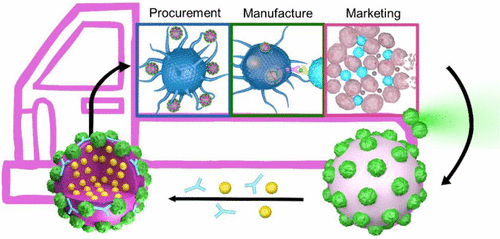当前位置:
X-MOL 学术
›
Acc. Chem. Res.
›
论文详情
Our official English website, www.x-mol.net, welcomes your
feedback! (Note: you will need to create a separate account there.)
Synthetic Particles for Cancer Vaccines: Connecting the Inherent Supply Chain.
Accounts of Chemical Research ( IF 16.4 ) Pub Date : 2020-09-18 , DOI: 10.1021/acs.accounts.0c00336 Yufei Xia 1, 2, 3 , Tiantian Song 1, 4 , Yuning Hu 1, 2, 3 , Guanghui Ma 1, 2, 3
Accounts of Chemical Research ( IF 16.4 ) Pub Date : 2020-09-18 , DOI: 10.1021/acs.accounts.0c00336 Yufei Xia 1, 2, 3 , Tiantian Song 1, 4 , Yuning Hu 1, 2, 3 , Guanghui Ma 1, 2, 3
Affiliation

|
Cancer vaccines have opened a new paradigm for safe and effective antitumor therapy, but they still suffer from shortcomings such as insufficient immunogenicity and immune tolerance, which seldom makes them the first choice in clinic. In fact, similar to providing a high-end product, a robust antitumor effect depends on the inherent supply chain, which attains, processes, and presents tumor-associated antigens via antigen presenting cells to T cells, which then leads to lysis of the cancer cells to release more antigens to complete the supply chain. Under these circumstances, the failure of cancer vaccines can be treated as a blockade or chain rupture. Thus, for effective tumor treatment, the key is to rationally design logistic systems to restore the supply chain.
中文翻译:

癌症疫苗的合成颗粒:连接固有的供应链。
癌症疫苗为安全有效的抗肿瘤治疗开辟了新的范式,但是它们仍然存在诸如免疫原性和免疫耐受性不足等缺点,这很少使它们成为临床的首选。实际上,类似于提供高端产品,强大的抗肿瘤作用取决于固有的供应链,该供应链可通过抗原呈递细胞获得,加工并呈递与肿瘤相关的抗原,然后将其提供给T细胞,从而导致癌症的溶解细胞释放更多的抗原以完成供应链。在这种情况下,癌症疫苗的失败可被视为封锁或链断裂。因此,为了有效地治疗肿瘤,关键是合理设计物流系统以恢复供应链。
更新日期:2020-10-21
中文翻译:

癌症疫苗的合成颗粒:连接固有的供应链。
癌症疫苗为安全有效的抗肿瘤治疗开辟了新的范式,但是它们仍然存在诸如免疫原性和免疫耐受性不足等缺点,这很少使它们成为临床的首选。实际上,类似于提供高端产品,强大的抗肿瘤作用取决于固有的供应链,该供应链可通过抗原呈递细胞获得,加工并呈递与肿瘤相关的抗原,然后将其提供给T细胞,从而导致癌症的溶解细胞释放更多的抗原以完成供应链。在这种情况下,癌症疫苗的失败可被视为封锁或链断裂。因此,为了有效地治疗肿瘤,关键是合理设计物流系统以恢复供应链。











































 京公网安备 11010802027423号
京公网安备 11010802027423号